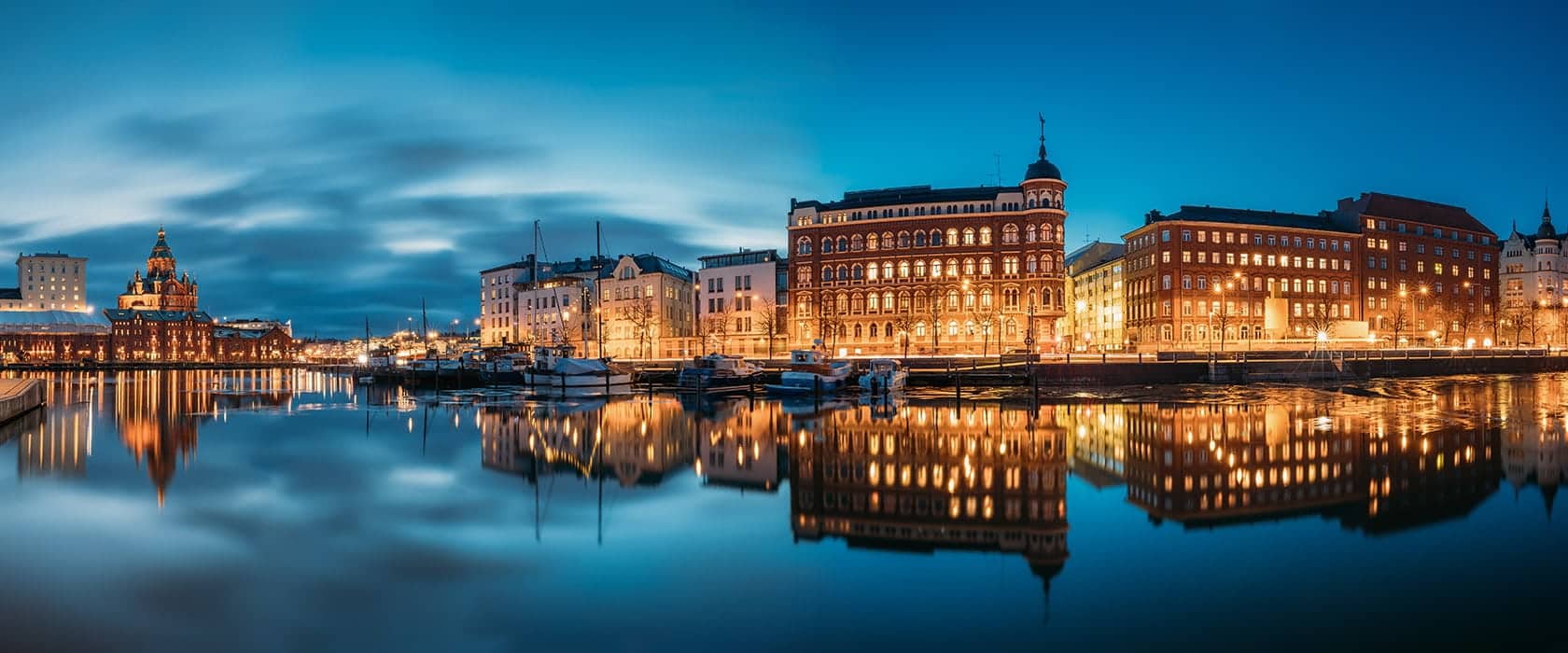-
Popular search terms
A Comprehensive Guide to Studying in:
Finland

Finland is a country of extremes, where long, dark, winter nights contrast with endless sunlight throughout the summer. It is home to some of the most dramatic landscapes in Europe – nature-lovers will never tire of exploring its 188,000 lakes and 180,000 islands as well as the forests that comprise 75% of its total land area. Around 20% of the country’s population resides in the capital, Helsinki, which ranks among the world’s best cities in terms of quality of life. The contrasts that exist throughout Finland make it a fascinating place to live, and there is no happier country in the world according to the UN’s World Happiness Report.
Finland’s unique education system is considered to be one of the best in the world. An increased focus on pedagogy – the art of teaching – is part of teacher training in Finland, while thriving tech and gaming industries make teaching materials innovative and cutting-edge. In fact, the Finnish education system is so respected that they actually export their education program worldwide. Despite a population of just 5.5 million, you will find several Finnish universities in global university rankings and they regularly outperform larger nations in higher education. A degree from a Finnish university is held in high regard all over the world and could leave you with bright job prospects.

Frequently Asked Questions
FAQ
Did You Know? Fun Facts About Finland
- 1 In 2022, Finland was ranked as the happiest country in the world for the fifth year in a row, according to the UN's World Happiness Report.
- 2 The best-known Finnish companies include mobile phone manufacturer Nokia and video game developer Rovio, which created the Angry Birds franchise.
- 3 Finland is the world's biggest consumer of coffee per capita. The average Finn drinks nearly four cups a day!
- 4 The official languages of Finland are Finnish and Swedish.
- 5 Forest covers 74% of Finland, an area larger than the UK or Italy.
Which Visas & permits do i need in Finland
Students from the EU/EEA are not required to obtain a student visa to study in Finland. Non-EU/EEA nationals need to apply for a continuous residence permit (an A permit) to complete a higher education degree in Finland. Make sure to start the application process well in advance, as the processing time can be at least two months. You need to provide documents like proof of acceptance, certificate of (health) insurance, proof of paid tuition fee, and others. You will also need to show proof of sufficient funds – EUR€560 per month. For a two-year stay, this means you must have EUR€13,440 at your disposal. With a residence permit, you are allowed to work in Finland if the work is related to your studies, for a maximum of 30 hours per week.
Banking in Finland
Opening a Finnish bank account is recommended if you are studying in Finland for a long period of time. The country’s leading banks are Holvi, Aktia Bank, Nordea Bank, OP Bank, and Danske Bank. All banks offer excellent customer service (in English), online banking options (also in English), and a wide network of ATMs and local branches.
The required documents usually include a valid passport, a residence permit card (if applicable), a certificate of student status, a Finnish personal identity code, and proof of address. Opening a bank account in Finland is free at all banks, with small monthly fees of around EUR€2. However, students can usually get free accounts.
What do I need to know about healthcare in Finland
Finland has one of the top 10 best healthcare systems in the world. If you have a Kela card, a European Health Insurance Card (EHIC), or a UK Global Health Insurance Card (GHIC), you do not need to take out insurance to study in Finland.
Finland has quite strict requirements on the type of insurance you need to obtain. However, the Finnish Immigration Services provides a helpful list of international health insurance providers for students that meet the requirements for granting a residence permit to study in Finland.
Housing options for students in Finland
The student housing market in Finland is primarily made up of two types of accommodation: student housing foundations and private rental accommodation, the latter of which can become expensive.
Fortunately, through student housing foundations, accommodation for students is highly accessible and affordable. Essentially, these student housing foundations act as landlords of student apartments and are governed by the SOA (the Finnish Associations of Student Housing Organizations). There are currently over 20 student housing organizations as part of the SOA – together, they own and operate nearly 45,000 rental apartments. In this type of accommodation, you will share a multiple-bedroom apartment with other students. Rent often includes utilities and water – some buildings will even offer a sauna and/or laundry facilities. The average monthly rent ranges from EUR€160 to €380.
What are the public transport options in Finland
Public transport in Finland is affordable and reliable. In Helsinki, you can use buses, trams, trains, and ferries, all operated by Helsinki Region Transport (HSL). Students who live in the HSL area can buy season tickets at a 45% discount (only on the HSL app). Cycling is also a common form of transport in Finland. In cities like Helsinki and Espoo, you can make use of bike-sharing services.
For long-distance traveling, you can make use of Finland’s long-distance buses or railway services. Onnibus, Matkahuolto, and ExpressBus are the biggest long-distance bus companies in Finland.
How much does a Big Mac cost in Finland
The Big Mac Index was invented by The Economist in 1986 as an informal way of measuring the purchasing power parity (PPP) between two currencies. The price of a Big Mac in Finland is EUR€4.50 (equivalent to US$4.83 and JP¥614). For US$50, you can buy 10 Big Macs.
Finland is a relatively expensive place to live. Monthly living expenses are around EUR€700-1,000, but you may need a higher budget to live in Helsinki. To obtain a residence permit in Finland, you need to show proof of sufficient funds, amounting to EUR€560 per month. For a two-year stay, this means you must have EUR€13,440.